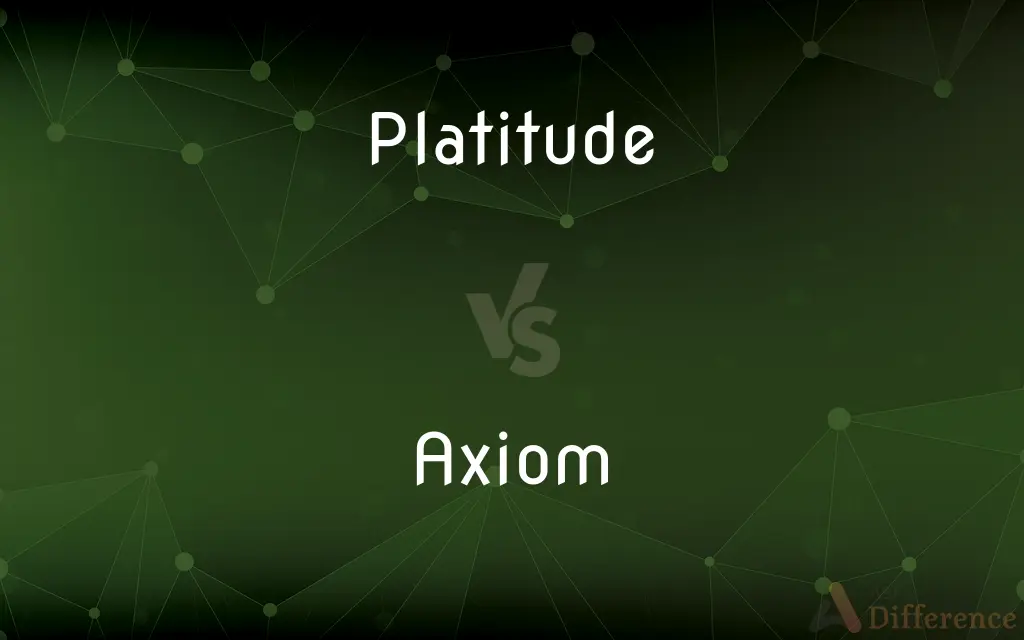Platitude vs. Axiom — What's the Difference?

Difference Between Platitude and Axiom
ADVERTISEMENT
Compare with Definitions
Platitude
A platitude is a trite, meaningless, or prosaic statement, often used as a thought-terminating cliché, aimed at quelling social, emotional, or cognitive unease. The statement may be true, but its meaning has been lost due to its excessive use.Platitudes have been criticized as giving a false impression of wisdom, making it easy to accept falsehoods: A platitude is even worse than a cliché.
Axiom
An axiom, postulate or assumption is a statement that is taken to be true, to serve as a premise or starting point for further reasoning and arguments. The word comes from the Greek axíōma (ἀξίωμα) 'that which is thought worthy or fit' or 'that which commends itself as evident.'The term has subtle differences in definition when used in the context of different fields of study.
Platitude
A remark or statement, especially one with a moral content, that has been used too often to be interesting or thoughtful
She began uttering liberal platitudes
Axiom
A statement or proposition which is regarded as being established, accepted, or self-evidently true
The axiom that sport builds character
Platitude
A trite or banal remark or statement, especially one expressed as if it were original or significant.
ADVERTISEMENT
Axiom
A self-evident or universally recognized truth; a maxim
“It is an economic axiom as old as the hills that goods and services can be paid for only with goods and services” (Albert Jay Nock).
Platitude
Lack of originality; triteness
"a passage of platitude which no critical prejudgment can force us to admire" (Edgar Allan Poe).
Axiom
An established rule, principle, or law.
Platitude
(countable) An often-quoted saying that is supposed to be meaningful but has become unoriginal or hackneyed through overuse; a cliché.
Axiom
A self-evident principle or one that is accepted as true without proof as the basis for argument; a postulate.
Platitude
(countable) A claim that is trivially true, to the point of being uninteresting.
Axiom
(philosophy) A seemingly self-evident or necessary truth which is based on assumption; a principle or proposition which cannot actually be proved or disproved.
Platitude
(uncountable) Flatness; lack of change, activity, or deviation.
Axiom
A fundamental assumption that serves as a basis for deduction of theorems; a postulate (sometimes distinguished from postulates as being universally applicable, whereas postulates are particular to a certain science or context).
Platitude
(uncountable) Unoriginality; triteness.
Axiom
An established principle in some artistic practice or science that is universally received.
The axioms of political economy cannot be considered absolute truths.
Platitude
The quality or state of being flat, thin, or insipid; flat commonness; triteness; staleness of ideas of language.
To hammer one golden grain of wit into a sheet of infinite platitude.
Axiom
A self-evident and necessary truth, or a proposition whose truth is so evident as first sight that no reasoning or demonstration can make it plainer; a proposition which it is necessary to take for granted; as, "The whole is greater than a part;" "A thing can not, at the same time, be and not be."
Platitude
A thought or remark which is flat, dull, trite, or weak; a truism; a commonplace.
Axiom
An established principle in some art or science, which, though not a necessary truth, is universally received; as, the axioms of political economy.
Platitude
A trite or obvious remark
Axiom
A saying that widely accepted on its own merits
Axiom
(logic) a proposition that is not susceptible of proof or disproof; its truth is assumed to be self-evident
Share Your Discovery

Previous Comparison
Energy vs. Essence
Next Comparison
Octal vs. Decimal














































